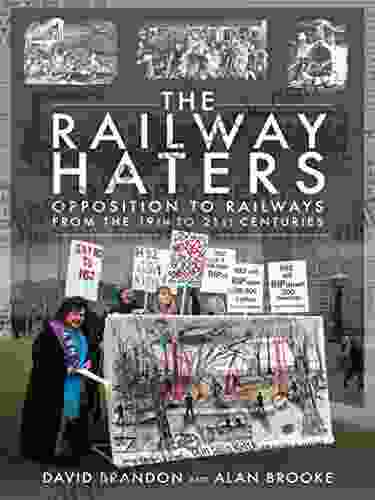Opposition to Railways from the 19th to the 21st Centuries: A Historical Perspective

The development of railways in the 19th century was a transformative event that had a profound impact on societies around the world. However, the construction and operation of railways also generated significant opposition, which has continued into the 21st century.
5 out of 5
| Language | : | English |
| File size | : | 70020 KB |
| Text-to-Speech | : | Enabled |
| Screen Reader | : | Supported |
| Enhanced typesetting | : | Enabled |
| Word Wise | : | Enabled |
| Print length | : | 413 pages |
| Lending | : | Enabled |
Objections to the of Railways
In the early days of railway development, opposition to the construction and operation of railways came from a variety of sources. Some of the most common objections included:
- Fear of accidents: Early railways were often seen as dangerous, and there were numerous accidents in the early years of operation. This fear was compounded by the fact that railways often ran through densely populated areas, increasing the risk of injuries and fatalities.
- Noise and pollution: Steam locomotives were noisy and produced large amounts of smoke and soot, which could create a nuisance for people living near railways. In addition, the construction of railways often required the clearing of land, which could result in the loss of trees and other vegetation.
- Disruption of traditional lifestyles: The construction of railways often disrupted traditional ways of life, especially in rural areas. Railways could divide communities and make it difficult for people to access their land or travel to other areas.
- Economic concerns: Some people feared that railways would lead to job losses, as they would replace traditional modes of transportation such as canals and stagecoaches. Others worried that railways would give unfair advantages to large companies and lead to monopolies.
Opposition to Railway Expansion in the 20th and 21st Centuries
As railways expanded in the 20th and 21st centuries, they continued to face opposition, although the nature of the objections changed somewhat. Some of the key concerns raised included:
- Environmental impact: The construction and operation of railways can have a significant impact on the environment. This includes the clearing of land, the pollution of air and water, and the fragmentation of habitats. In recent years, there has been growing opposition to railway projects that are seen as posing a threat to the environment.
- Social impact: The construction of railways can also have a significant social impact, especially in communities that are divided by railway lines. Railways can create noise and pollution, disrupt access to land, and lead to the displacement of people. In some cases, railways have been used to divide communities and suppress political dissent.
- Economic impact: While railways can bring economic benefits to some communities, they can also have negative economic impacts on others. For example, the construction of new railway lines can lead to the loss of jobs in traditional transportation sectors. In addition, railways can create barriers to economic development by dividing communities and making it difficult to access markets.
The opposition to railways has a long and complex history, dating back to the early days of railway development in the 19th century. While the nature of the objections has changed over time, the core concerns have remained the same: fear of accidents, noise and pollution, disruption of traditional lifestyles, economic concerns, and environmental and social impacts. As railways continue to expand and develop in the 21st century, it is likely that they will continue to face opposition from a variety of sources. However, by understanding the history of opposition to railways, we can better address the concerns of opponents and work to mitigate the negative impacts of railway development.
Image Credits:
- Protesters against HS2 by 2009jfh (Own work) [CC BY-SA 3.0], via Wikimedia Commons
- Railway construction in India, 1857 by Bourne & Shepherd (Public domain),via Wikimedia Commons
5 out of 5
| Language | : | English |
| File size | : | 70020 KB |
| Text-to-Speech | : | Enabled |
| Screen Reader | : | Supported |
| Enhanced typesetting | : | Enabled |
| Word Wise | : | Enabled |
| Print length | : | 413 pages |
| Lending | : | Enabled |
Do you want to contribute by writing guest posts on this blog?
Please contact us and send us a resume of previous articles that you have written.
 Novel
Novel Page
Page Text
Text Story
Story Reader
Reader Magazine
Magazine Newspaper
Newspaper Paragraph
Paragraph Sentence
Sentence Glossary
Glossary Foreword
Foreword Annotation
Annotation Footnote
Footnote Manuscript
Manuscript Codex
Codex Tome
Tome Bestseller
Bestseller Library card
Library card Narrative
Narrative Memoir
Memoir Encyclopedia
Encyclopedia Narrator
Narrator Resolution
Resolution Catalog
Catalog Borrowing
Borrowing Stacks
Stacks Periodicals
Periodicals Research
Research Scholarly
Scholarly Lending
Lending Reserve
Reserve Reading Room
Reading Room Rare Books
Rare Books Literacy
Literacy Study Group
Study Group Dissertation
Dissertation Awards
Awards Reading List
Reading List Theory
Theory Textbooks
Textbooks Narendra Malhotra
Narendra Malhotra Mark Phillips
Mark Phillips Erika Robuck
Erika Robuck Jacob Johnston
Jacob Johnston Susan Schafer
Susan Schafer Ryan Reisert
Ryan Reisert Darrell Park
Darrell Park Greater Than A Tourist
Greater Than A Tourist Becky Aud Jennison
Becky Aud Jennison Patricia Briggs
Patricia Briggs Barbara Krasner
Barbara Krasner Nils Parker
Nils Parker Janette K Klingner
Janette K Klingner Carlos Thions
Carlos Thions Michael Scheuer
Michael Scheuer Thom Holmes
Thom Holmes Captain Hooter
Captain Hooter Catlin R Tucker
Catlin R Tucker Mika Lane
Mika Lane Beth Beutler
Beth Beutler
Light bulbAdvertise smarter! Our strategic ad space ensures maximum exposure. Reserve your spot today!

 Earl WilliamsThread Weaver Frankel: A Tapestry of Textiles, Storytelling, and Inspiration
Earl WilliamsThread Weaver Frankel: A Tapestry of Textiles, Storytelling, and Inspiration Geoffrey BlairFollow ·16.3k
Geoffrey BlairFollow ·16.3k Corbin PowellFollow ·4.2k
Corbin PowellFollow ·4.2k Gregory WoodsFollow ·2.8k
Gregory WoodsFollow ·2.8k Ernest ClineFollow ·11k
Ernest ClineFollow ·11k John SteinbeckFollow ·16k
John SteinbeckFollow ·16k Dylan HayesFollow ·6.2k
Dylan HayesFollow ·6.2k Giovanni MitchellFollow ·2.9k
Giovanni MitchellFollow ·2.9k Sammy PowellFollow ·6.8k
Sammy PowellFollow ·6.8k

 Ralph Ellison
Ralph EllisonHealth Care Global Viewpoints: Samantha Whiskey
Samantha Whiskey is a global health...

 Gabriel Garcia Marquez
Gabriel Garcia MarquezTeacher Educators' Reflections on Culturally Relevant...
In today's...

 Levi Powell
Levi PowellSustainable Project Management: The GPM Reference Guide...
In today's rapidly changing world,...

 Isaac Bell
Isaac BellThe Captivating World of "Dreaming Awake Falling Under"
A Journey Through...

 Clarence Brooks
Clarence BrooksGovernance Regulations Valuations Mergers And...
In today's complex and ever-changing...
5 out of 5
| Language | : | English |
| File size | : | 70020 KB |
| Text-to-Speech | : | Enabled |
| Screen Reader | : | Supported |
| Enhanced typesetting | : | Enabled |
| Word Wise | : | Enabled |
| Print length | : | 413 pages |
| Lending | : | Enabled |










